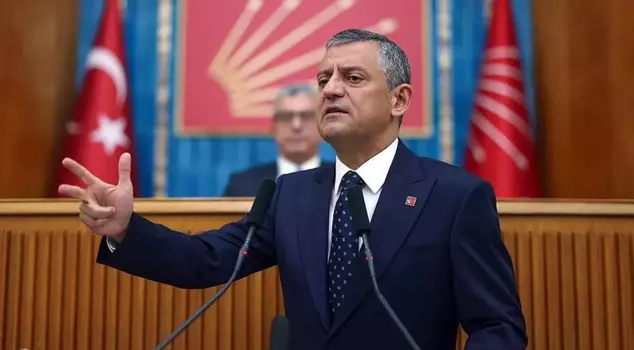
08.07.2025 12:30
The motion for the lifting of immunity for CHP Chairman Özgür Özel, İYİ Party Group Deputy Chairman Turhan Çömez, and CHP Istanbul Deputy Turan Taşkın Özer has been sent to the Constitutional and Justice Joint Committee.
```html
By the Presidency of the Grand National Assembly, the Presidential Decrees on the Lifting of Legislative Immunity have been referred to the Joint Committee composed of members of the Constitutional and Justice Commissions.
The members of parliament whose files have been referred to the Joint Committee are as follows: CHP Chairman Özgür Özel, İYİ Party Group Deputy Chairman and Balıkesir Deputy Turhan Çömez, and CHP Istanbul Deputy Turan Taşkın.
HOW DOES THE PROCESS OF LIFTING PARLIAMENTARY IMMUNITY WORK?
A PREPARATORY COMMITTEE IS ESTABLISHED
The Chairman of the Joint Committee establishes a 5-member Preparatory Committee by drawing lots from among the members that each political party can nominate to examine the immunity files. The Preparatory Committee elects a chairman and a secretary who will also perform the spokesperson duties by secret ballot. The Preparatory Committee prepares its report by examining the file within a maximum of 1 month from the moment it is established. This committee reviews all documents and may listen to the relevant member of parliament if necessary, but cannot hear witnesses.
If the Preparatory Committee decides to lift the legislative immunity, the file is referred to the Joint Committee. The Joint Committee also concludes the matter by discussing the report and its annexes of the Preparatory Committee within 1 month.
The Joint Committee decides whether to lift the immunity or to postpone the prosecution until the end of the parliamentary term. If the Joint Committee decides to postpone the prosecution, the report in this regard is presented to the General Assembly for information. If no objections are made by the members of parliament within 10 days, the report becomes final; if there are objections, the report is placed on the agenda of the General Assembly. Files that are not objected to are sent to the Presidency.
Reports from the Joint Committee regarding the lifting of immunity are directly placed on the agenda of the General Assembly. The General Assembly can either accept the report and decide to lift the immunity or reject the report and decide to postpone the prosecution until the end of the term.
If the prosecution has been postponed and this decision has not been lifted by the General Assembly, prosecution cannot be conducted against the relevant member of parliament as long as their parliamentary status continues, even if the term has been renewed.
GENERAL ASSEMBLY STAGE
The report of the Joint Committee distributed to the members of parliament is read and discussed in the General Assembly. Two members of parliament, one in favor and the other against, speak on the report. If the member of parliament with the indictment wishes, they can defend themselves in the Preparatory Committee, the Joint Committee, or the General Assembly, or they can delegate this right to another member of parliament. If there are no requests for the floor or defense, the discussions are concluded. Then, the report of the Joint Committee regarding the lifting of legislative immunity is put to a vote. According to general practice, a public vote is conducted. In the vote regarding the lifting of immunities in the General Assembly, a quorum of 151 is sufficient.
A SEPARATE VOTE IS HELD FOR EACH MEMBER OF PARLIAMENT AND FILE
In the vote in the General Assembly, a separate vote is held for each member of parliament and each indictment. If there are two files against a member of parliament, both files are voted on separately. Prosecution can only be conducted regarding the indictment for which immunity has been lifted. The immunity regarding the file that has been postponed until the end of the term continues.
After the decision of the General Assembly, the immunity of the member of parliament is lifted for the relevant file.
The Presidency sends the file to the Ministry of Justice through the Presidency. The Ministry then refers the file of the member of parliament whose immunity has been lifted to the relevant prosecutor's office for necessary action. After the file reaches the prosecutor's office, the investigation continues from where it left off, and the relevant member of parliament may be referred to court with a request for arrest or may continue to be tried without detention.
IMMUNITY IS LIFTED BUT PARLIAMENTARY STATUS CONTINUES
The lifting of a member of parliament's immunity does not terminate their parliamentary status; it continues. The member of parliament receives their salary and benefits from other social rights. If they have not been arrested, they can come to the Assembly and participate in legislative activities. Just as a citizen continues their life without detention, a member of parliament can continue their work life in the same way.
However, after the conviction regarding the member of parliament becomes final, it is read in the General Assembly, and at that time, their parliamentary status is terminated.
If a decision is made to lift the legislative immunity of a member of parliament or to terminate their parliamentary status, the relevant member of parliament or another member of parliament can apply to the Constitutional Court for annulment on the grounds that the decision is contrary to the Constitution, the law, or the Internal Regulations within 7 days from the date the decision of the General Assembly is made. The Constitutional Court decides on the annulment request within 15 days.
```